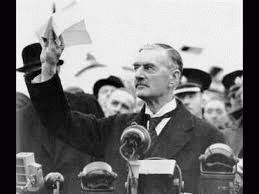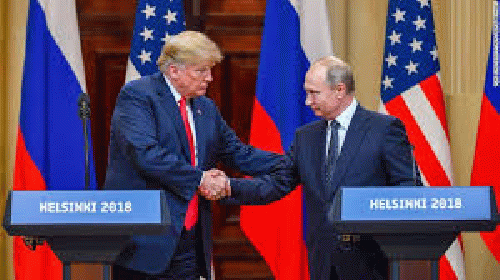It's difficult not to compare the most recent summit in Helsinki between an aggressive dictator, Vladimir Putin, and a naà �ve Western leader, Donald Trump, with the infamous meeting, almost exactly eighty years ago, between German Chancellor Adolph Hitler and British Prime Minister Neville Chamberlain. The famous picture of Chamberlain returning from Munich in September, 1938, waving a signed document and declaring the immortal words: "Peace for our time," has become one of the twentieth century's most durable and iconic images.
Having tested Western resolve and found it lacking, Hitler moved swiftly to absorb the province, then engineer the takeover or Anschluss of Austria, and within the year launch his campaign to conquer Poland and subsequently the rest of Europe--igniting World War II.
Over the ensuing decades, the names Munich and Chamberlain have stood as notorious reminders to all those with historical memories of the dangerous consequences of appeasing dictators and giving in to aggression.
Trump's mysterious admiration of Putin, a Russian nationalist strongman who has already transformed European boundaries by military means in Georgia, Crimea (a Russian-speaking region of neighboring Ukraine,) and by continuing to intervene and destabilize Eastern Ukraine, was on obsequious display last week in Helsinki. Even more puzzling, his inability or unwillingness to accept the unanimous findings by his own intelligence services that Russia and Putin had mounted covert attacks on America's own electoral systems in 2016, and were planning to do so in 2018, have left many Americans in a state of disbelief, unnerving even some of his most loyal Republican political supporters.
More disturbing to America's European allies have been Trump's own sustained attacks on the cornerstone policies devised in the aftermath of the World War to keep the peace in Europe and further the development of democratic governments worldwide. Along with promoting tariff wars and a throwback "America First" policy reminiscent of isolationism in the 1930s, the American President appears to be either ignorant of or determined to rewrite eight decades of world history.
While Putin is no Hitler and Russia currently lacks Nazi Germany's global ambitions, a destabilized European Union and fractured NATO alliance certainly further the longstanding Russian goals of strongly influencing and even potentially dominating the continent, politically and economically if not militarily. Neighboring countries, until recently under direct Soviet control, many with Russian-speaking minorities, have valid and renewed concerns about America's commitment to their protection.
True to form, and despite serious criticism at home and abroad, and evidently against the better judgment many in his own administration, Donald Trump doubled-down on his policy by deciding to honor Vladimir Putin with an invitation to visit the White House in the fall for another summit.
Recent reports indicate that opposition from Republican Party leaders and political considerations relating to midterm elections may well cause a delay in the proposed second Trump-Putin summit--or if Putin has his way, its transfer to Moscow! Still, whenever or wherever it occurs it's hard to imagine a more appropriate--or ominous-- way to commemorate the events in Munich those eight decades ago.
Les Adler
Emeritus Professor of History
Sonoma State University






